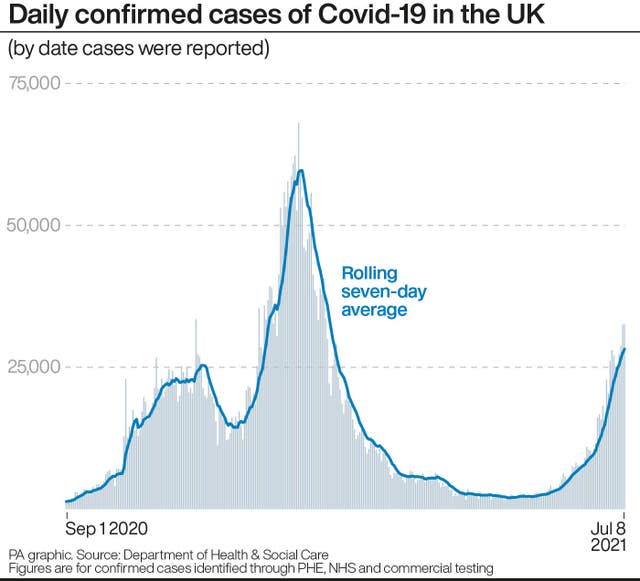Public warned not to ignore Covid app as virus cases continue to rise
People have been urged not to ignore the NHS Covid app if they are advised to self-isolate, with coronavirus infections in three of the four UK nations at the highest levels since winter.
Downing Street has asked that people keep using the app, with the Prime Minister’s official spokesman saying Boris Johnson is doing so.
The No 10 spokesman said the app had been an “important tool” in breaking the chain of transmission of coronavirus.
“The Prime Minister has been clear that he continues to use it,” the spokesman said.
The spokesman added: “We continue to ask people to isolate if they are asked to through the app.”
The plea was echoed by Transport Secretary Grant Shapps who stressed the app’s importance, against a backdrop of concerns about the increasing numbers being “pinged” as restrictions are rolled back.
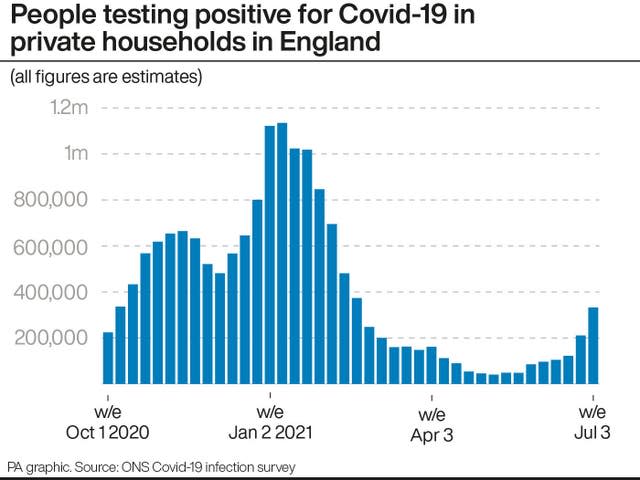
Rules governing travel for people in England are due to be eased on July 19, but measures on self-isolation for the fully vaccinated will remain in place until August 16, raising fears that people will delete the app rather than risk having to cancel a holiday.
Mr Shapps told BBC Radio 4’s Today programme: “You shouldn’t ignore this (the app) because it is vital information. People should want to know if they have been in contact with somebody with coronavirus.
“You don’t want to be spreading it around. It can still harm people.”
Protect your loved ones by using the @NHSCOVID19app
The more people that use the app, the more we can protect our friends, families and communities.
More info https://t.co/rzgGGmuV13 pic.twitter.com/Jtm5kCz0Tv
— NHS COVID-19 app (@NHSCOVID19app) July 7, 2021
The number of exposure alerts sent to users of the app in England soared by more than 60% in a week, according to the latest contact tracing figures.
The head of the UK Health Security Agency, Dr Jenny Harries, told the Commons Public Accounts Committee on Thursday that work is being done to “tune” the app to work within an increasingly vaccinated population to ensure it is there “for a purpose, not for annoyance”.
Mr Shapps reiterated this on Friday, saying the sensitivity of the app is being kept under constant review and that it could possibly by tweaked “to be suitable to the circumstances of the time”. He said he had spoken to Health Secretary Sajid Javid about it.
“He is very aware of this and we will keep it under constant review because we want the app to be a useful tool in our armoury,” Mr Shapps told Sky News.
Professor Henry Potts, a member of the Spi-B group of behavioural experts advising the Government, said that if ministers want people to self-isolate they need to make it easier to do so.
“The problem of people deleting the app or simply turning the app off or ignoring what it says has been a problem for many months. We have seen steadily rising numbers of people deleting the app,” he told the Today programme.
He added: “The best way of improving isolation is more support – financial support, it can also be practical support.”
Friday saw the the highest daily number of reported cases since January 22, with a further 35,707 lab-confirmed Covid-19 cases in the UK.
The latest estimates from the Office for National Statistics (ONS) suggest infection levels are at their highest since mid-January in Scotland, and since February for England and Wales.
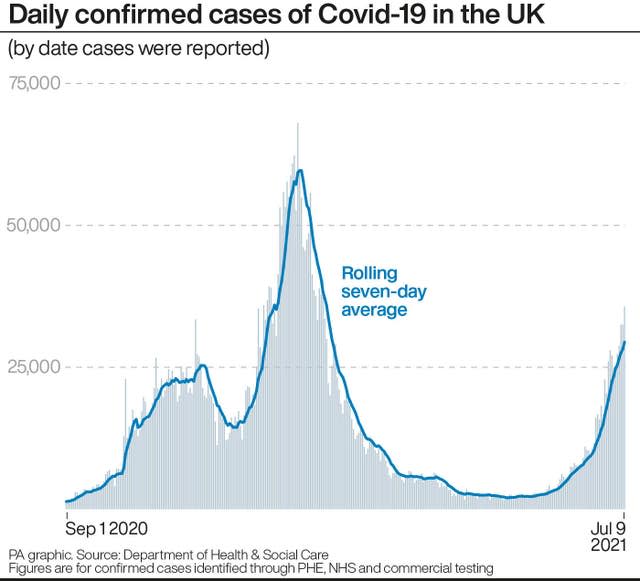
Around one in 100 people in private households in Scotland are estimated to have had Covid-19 in the week to July 3.
The latest figure was around one in 160 people in England and one in 340 in Wales.
The most recent estimate for Northern Ireland is one in 300 people, up from one in 670, and the highest since the week to April 3.
The coronavirus reproduction number, or R value, in England has increased slightly and is now between 1.2 to 1.5, according to a Government estimate, meaning that, on average, every 10 people infected will infect between 12 and 15 other people.
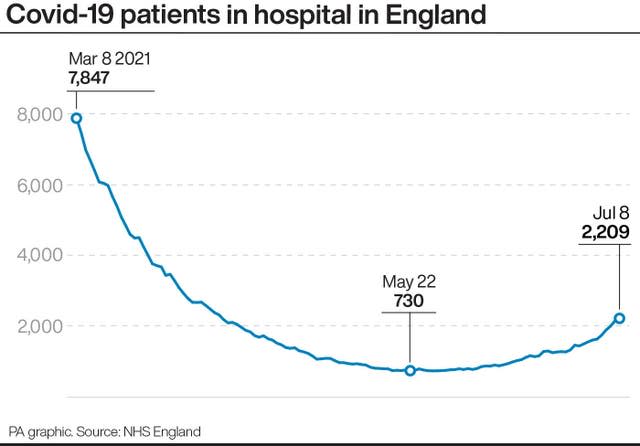
Elsewhere, the latest figures from Public Health England (PHE) show cases of the dominant Delta variant rose by a third in the past week.
A total of 216,249 confirmed and probable cases of that variant, first identified in India and which now accounts for approximately 99% of confirmed cases of coronavirus across the UK – have been identified in the four nations.
Of these, 180,643 have been in England, 28,559 in Scotland, 3,666 in Wales and 3,381 in Northern Ireland.
It remains the case that the majority of people being admitted to hospital in England with the Delta variant are unvaccinated, according to the PHE figures.
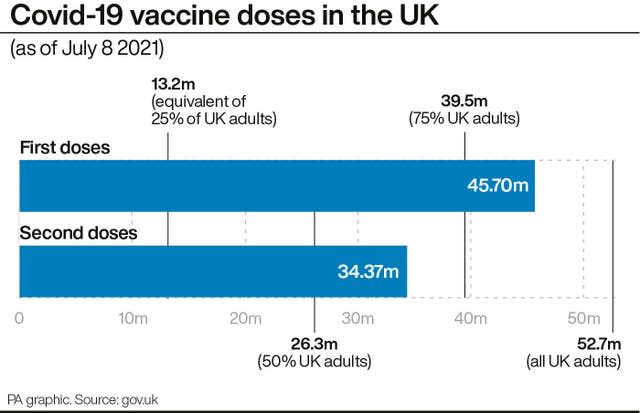
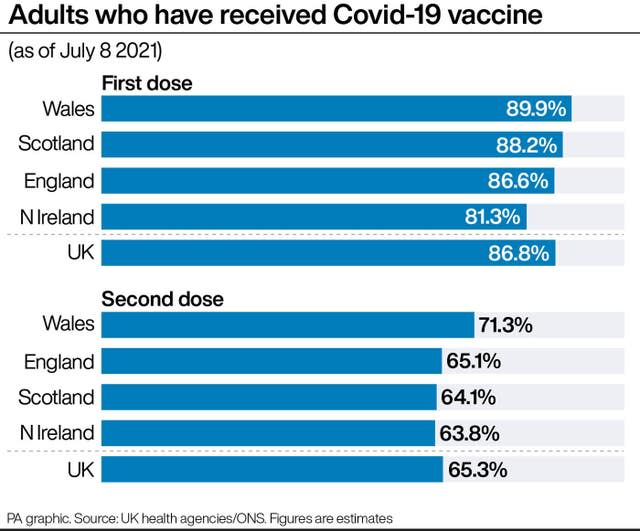
Dr Harries said the data continues to show the protection offered by coronavirus jabs, but that rising levels of infection should prompt a “cautious and careful” approach.
She said: “The data continues to show that the sharp increase in cases that we are seeing is not being followed by a similar increase in hospitalisation and death.”
Dr Harries added: “As we approach the planned end of restrictions, we must remain cautious and careful. Cases are rising across the country, and whilst the vaccines offer excellent protection, they do not offer 100% protection.
“Be sensible, and follow ‘hands, face, space, fresh air’ at all times, and make sure to get tested if required.”
Meanwhile, Chancellor Rishi Sunak has stressed the benefits of getting back to the workplace when coronavirus restrictions lift.
The order to work from home is expected to be scrapped on July 19 in England and Mr Sunak said he is looking forward to the shift back to offices.
But unions have raised concerns about the lack of guidance for employees to safely return to the workplace.
Mr Sunak told the Daily Telegraph: “I think, for young people especially, that ability to be in your office, be in your workplace and learn from others more directly, is something that’s really important, and I look forward to us slowly getting back to that.”
He said it is not for ministers to tell firms what they should or should not do, adding: “Ultimately I trust people and businesses to make decisions for themselves.”
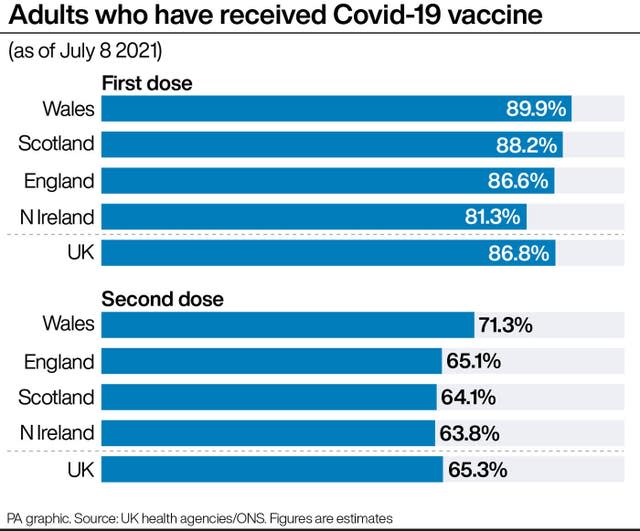
The Trades Union Congress has written to ministers to raise concerns about the lack of consultation on plans which will affect millions of workers.
TUC general secretary Frances O’Grady warned that without detailed plans the country could be “hobbled by rising infections and enforced self-isolation” keeping workers out of action.

 Yahoo News
Yahoo News 

